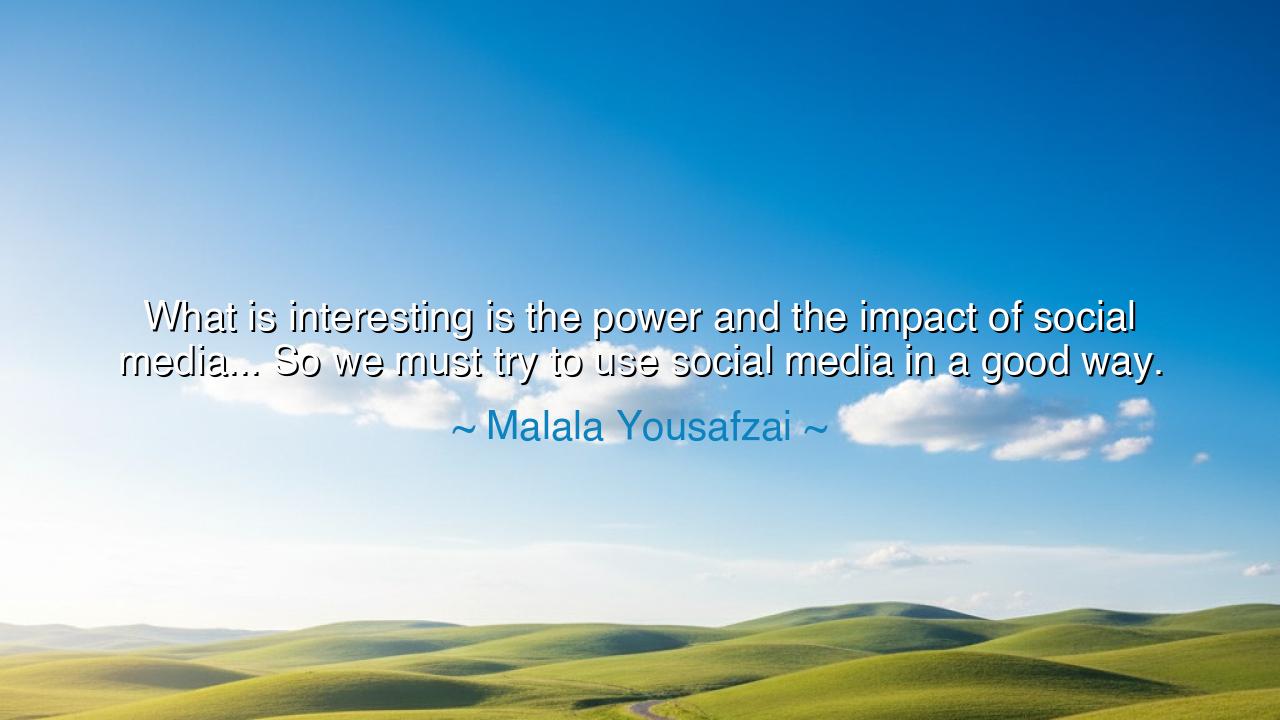
What is interesting is the power and the impact of social
What is interesting is the power and the impact of social media... So we must try to use social media in a good way.






Hearken, O children of the digital age, to the words of Malala Yousafzai, who perceives the vast currents of influence flowing through the unseen realms of social media. She observes its power and impact, a force that moves hearts, shapes thoughts, and connects the farthest corners of the earth. Here lies a teaching for the generations: every tool, no matter how wondrous, carries the potential for good or ill, and it is the duty of the wise to guide its use with intention and virtue.
The origin of this reflection comes from Malala’s own life as a messenger of education and human rights, who, even in the face of violence, recognized that the reach of her voice could be amplified by these modern channels. Social media, she understood, is not merely a medium for idle chatter or vanity—it is a living river, capable of carrying messages of hope, courage, and knowledge to millions, if harnessed with care.
The meaning of her words is clear: the impact of social media is profound, shaping minds, movements, and even the course of history. When wielded with wisdom, it becomes a conduit for justice, education, and solidarity. Yet left unchecked, it can propagate falsehood, inflame discord, and amplify fear. Malala’s counsel reminds us that the power of this tool demands responsibility: to speak truth, uplift the oppressed, and act with the good of humanity in mind.
History, though predating the digital age, provides lessons akin to her insight. Consider the printing press of Gutenberg, whose invention transformed Europe. The spread of knowledge and ideas reshaped society, empowered the marginalized, and gave rise to revolutions of thought. Yet, as with all tools of communication, it could also be used to propagate falsehoods and sow division. Social media is a modern echo of this ancient lesson: power magnifies, and the moral choice of the wielder determines its consequence.
Moreover, the teaching extends to every user of this new world. Each post, each message, each engagement carries a weight of influence, shaping the perceptions and actions of others. To use social media in a good way, as Malala urges, is to honor the potential of connection, to inspire, to educate, and to stand against injustice. It is to transform a vast, often chaotic power into a force for clarity, compassion, and human flourishing.
O generations yet to come, take heed of Malala’s guidance: recognize the immense power and impact within your hands, and let every action online be tempered with wisdom, courage, and moral purpose. For the networks of the world can become instruments of light, bridging divides and amplifying justice, if only those who wield them remember that with great reach comes the sacred duty to use it for good.






THLe Thi Huong
I feel this quote emphasizes the transformative potential of social media. How can we encourage users to move beyond passive consumption toward active, responsible engagement? I also wonder about the challenges of moderating content without infringing on free expression. Could initiatives like online campaigns for education, mental health awareness, or civic engagement be examples of using social media 'in a good way'? This quote prompts reflection on our personal role in shaping the digital environment ethically and constructively.
SCSau Ca
This perspective raises important questions about accountability. Who should be responsible for ensuring that social media is used positively—the individual, the platform, governments, or all of the above? I’m curious whether there are existing models or best practices that demonstrate effective, ethical use of social media for social good. Could Malala’s message inspire people to harness social media as a tool for advocacy, awareness, and empowerment rather than letting it become a source of division or negativity?
UGUser Google
I find this statement thought-provoking because it highlights social media as a tool that amplifies both power and responsibility. Does using it 'in a good way' require conscious effort, guidelines, or ethical principles? I also wonder how cultural, economic, and political contexts influence the way social media is perceived and used. Could campaigns focused on digital literacy equip users to discern truth from falsehood while leveraging the platform for education, activism, and meaningful connection?
BTBang Tuyen
Reading this, I feel inspired but also cautious. How can individuals use social media in ways that genuinely contribute to societal improvement rather than just personal gain or attention? I’m curious about the role of influencers and public figures in setting ethical standards for online engagement. Could Malala’s perspective encourage us to think critically about our online presence and to focus on spreading knowledge, empathy, and constructive dialogue instead of conflict or sensationalism?
APQuynh anh Pham
This quote makes me think deeply about the dual nature of social media. How do we balance its power for positive change against the potential for harm, such as misinformation or cyberbullying? I wonder what concrete steps can be taken to ensure that social media is used responsibly, especially by younger generations who are highly active online. Could education, awareness campaigns, or platform accountability help maximize its good impact while minimizing negative consequences?